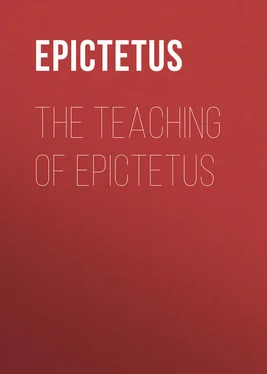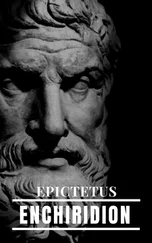Epictetus - The Teaching of Epictetus
Здесь есть возможность читать онлайн «Epictetus - The Teaching of Epictetus» — ознакомительный отрывок электронной книги совершенно бесплатно, а после прочтения отрывка купить полную версию. В некоторых случаях можно слушать аудио, скачать через торрент в формате fb2 и присутствует краткое содержание. Жанр: Философия, foreign_antique, foreign_prose, на английском языке. Описание произведения, (предисловие) а так же отзывы посетителей доступны на портале библиотеки ЛибКат.
- Название:The Teaching of Epictetus
- Автор:
- Жанр:
- Год:неизвестен
- ISBN:нет данных
- Рейтинг книги:5 / 5. Голосов: 1
-
Избранное:Добавить в избранное
- Отзывы:
-
Ваша оценка:
- 100
- 1
- 2
- 3
- 4
- 5
The Teaching of Epictetus: краткое содержание, описание и аннотация
Предлагаем к чтению аннотацию, описание, краткое содержание или предисловие (зависит от того, что написал сам автор книги «The Teaching of Epictetus»). Если вы не нашли необходимую информацию о книге — напишите в комментариях, мы постараемся отыскать её.
The Teaching of Epictetus — читать онлайн ознакомительный отрывок
Ниже представлен текст книги, разбитый по страницам. Система сохранения места последней прочитанной страницы, позволяет с удобством читать онлайн бесплатно книгу «The Teaching of Epictetus», без необходимости каждый раз заново искать на чём Вы остановились. Поставьте закладку, и сможете в любой момент перейти на страницу, на которой закончили чтение.
Интервал:
Закладка:
CHAPTER V
the promise of philosophy
1. Of things that exist, some are in our own power, some are not in our own power. Of things that are in our own power are our opinions, impulses, pursuits, avoidances, and, in brief, all that is of our own doing. Of things that are not in our own power are the body, possessions, reputation, authority, and, in brief, all that is not of our own doing. And the things that are in our own power are in their nature free, not liable to hindrance or embarrassment, while the things that are not in our own power are strengthless, servile, subject, alien.
2. Remember, then, if you hold things by their nature subject to be free, and things alien to be your proper concern, you will be hampered, you will lament, you will be troubled, you will blame Gods and men. But if you hold that only to be your own which is so, and the alien for what it is, alien, then none shall ever compel you, none shall hinder you, you will blame no one, accuse no one, you will not do the least thing unwillingly, none shall harm you, you shall have no foe, for you shall suffer no injury.
3. Aiming, then, at things so high, remember that it is no moderate passion wherewith you must attempt them, but some things you must utterly renounce, and put some, for the present, aside. For if, let us say, you aim also at this, to rule and to gather riches, then you are like, through aiming at the chief things also, to miss these lower ends; and shall most assuredly miss those others, through which alone freedom and happiness are won. Straightway, then, practice saying to every harsh appearance — Thou art an Appearance and not at all the thing thou appearest to be . Then examine it, and prove it by the rules you have, but first and above all by this, whether it concern something that is in our own power, or something that is not in our own power. And if the latter, then be the thought at hand: It is nothing to Me.
CHAPTER VI
the way of philosophy
1. A certain Roman having entered with his son and listened to one lecture, “This,” said Epictetus, “is the manner of teaching;” and he was silent. But when the other prayed him to continue, he spake as follows: —
Every art is wearisome, in the learning of it, to the untaught and unskilled. Yet things that are made by the arts immediately declare their use, and for what they were made, and in most of them is something attractive and pleasing. And thus when a shoemaker is learning his trade it is no pleasure to stand by and observe him, but the shoe is useful, and moreover not unpleasing to behold. And the learning of a carpenter’s trade is very grievous to an untaught person who happens to be present, but the work done declares the need of the art. But far more is this seen in music, for if you are by where one is learning, it will appear the most painful of all instructions; but that which is produced by the musical art is sweet and delightful to hear, even to those who are untaught in it. And here we conceive the work of one who studies philosophy to be some such thing, that he must fit his desire to all events, so that nothing may come to pass against our will, nor may aught fail to come to pass that we wish for. Whence it results to those who so order it, that they never fail to obtain what they would, nor to avoid what they would not, living, as regards themselves, without pain, fear, or trouble; and as regards their fellows, observing all the relations, natural and acquired; as son or father, or brother or citizen, or husband or wife, or neighbor or fellow-traveler, or prince or subject. Such we conceive to be the work of one who pursues philosophy. And next we must inquire how this may come about.
2. We see, then, that the carpenter becomes a carpenter by learning something, and by learning something the pilot becomes a pilot. And here also is it not on this wise? Is it enough that we merely wish to become good and wise, or must we not also learn something? We inquire, then, what we have to learn?
3. The philosophers say that, before all things, it is needful to learn that God is, and taketh thought for all things; and that nothing can be hid from Him, neither deeds, nor even thoughts or wishes. Thereafter, of what nature the Gods are. For whatever they are found to be, he who would please and serve them must strive, with all his might, to be like unto them. If the Divine is faithful, so must he be faithful; if free, so must he be free; if beneficent, so must he be beneficent; if high-minded, so must he be high-minded; so that thus emulating God, he shall both do and speak the things that follow therefrom. 17 17 Note that in this passage “God” and “the Gods” and “the Divine” are all synonymous terms.
4. Whence, then, shall we make a beginning? If you will consider this with me, I shall say, first, that you must attend to the sense of words. 18 18 Or “of names.”
– “So I do not now understand them?”
You do not.
– “How, then, do I use them?”
As the unlettered use written words, or as cattle use appearances; for the use is one thing and understanding another. But if you think you understand, then take any word you will, 19 19 Some texts add “such as Good or Evil.”
and let us try ourselves, whether we understand it. But it is hateful to be confuted, for a man now old, and one who, perhaps, hath served his three campaigns! And I too know this. For you have come to me now as one who lacketh nothing. And what could you suppose to be lacking to you? Wealth have you, and children, and it may be a wife, and many servants; Cæsar knows you, you have won many friends in Rome, you give every man his due, you reward with good him that doeth good to you, and with evil him that doeth evil. What is still lacking to you? If, now, I shall show you that you lack the greatest and most necessary things for happiness, and that to this day you have cared for everything rather than for what behooved you; and if I crown all and say that you know not what God is nor what man is, nor Good nor Evil; – and what I say of other things is perhaps endurable, but if I say you know not your own self, how can you endure me, and bear the accusation, and abide here? Never – but straightway you will go away in anger. And yet what evil have I done you? Unless the mirror doth evil to the ill-favored man, when it shows him to himself such as he is, and unless the physician is thought to affront the sick man when he may say to him: Man, dost thou think thou ailest nothing? Thou hast a fever: fast to-day and drink water. And none saith, What an affront . But if one shall say to a man: Thy pursuits art inflamed, thine avoidances are mean, thy purposes are lawless, thy impulses accord not with nature, thine opinions are vain and lying – straightway he goeth forth and saith, He affronted me .
5. We follow our business as in a great fair. Cattle and oxen are brought to be sold; and the greater part of the men come some to buy, some to sell; and few are they who come for the spectacle of the fair, – how it comes to pass, and wherefore, and who are they who have established it, and to what end. And so it is here, too, in this assembly of life. Some, indeed, like cattle, concern themselves with nothing but fodder; even such as those that care for possessions and lands and servants and offices, for these are nothing more than fodder. But few are they who come to the fair for love of the spectacle, what the world is and by whom it is governed. By no one? And how is it possible that a state or a house cannot endure, no not for the shortest time, without a governor and overseer, but this so great and fair fabric should be guided thus orderly by chance and accident? There is, then, one who governs. But what is his nature? and how doth he govern? and we, that were made by him, what are we, and for what are we? or have we at least some intercourse and link with him, or have we none? Thus it is that these few are moved, and thenceforth study this alone, to learn about the fair, and to depart. What then? they are mocked by the multitude. And in the fair, too, the observers are mocked by the traders; and had the cattle any reflection they would mock all those who cared for anything else than fodder.
Читать дальшеИнтервал:
Закладка:
Похожие книги на «The Teaching of Epictetus»
Представляем Вашему вниманию похожие книги на «The Teaching of Epictetus» списком для выбора. Мы отобрали схожую по названию и смыслу литературу в надежде предоставить читателям больше вариантов отыскать новые, интересные, ещё непрочитанные произведения.
Обсуждение, отзывы о книге «The Teaching of Epictetus» и просто собственные мнения читателей. Оставьте ваши комментарии, напишите, что Вы думаете о произведении, его смысле или главных героях. Укажите что конкретно понравилось, а что нет, и почему Вы так считаете.












